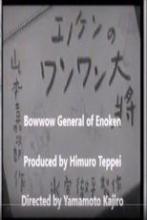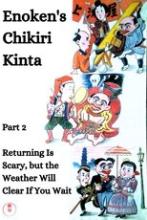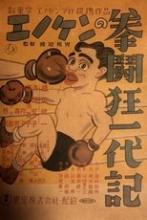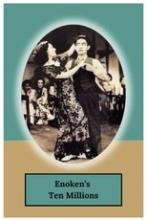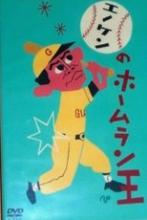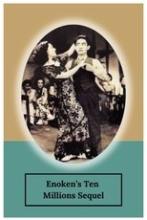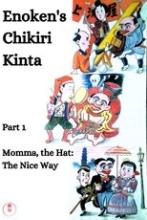
Enoken Collection
Collection of films revolving around Enoken.
Enoken's Kondo Isami (1935)
11 October, 1935
Enoken plays both Kondo Isami and his deadly enemy Sakamoto Ryoma in this comedic, song-filled vision of the Meiji Restoration.
Enoken's Bow-Wow General (1940)
16 July, 1940
Enoken no wanwan taishô AKA Wanwan Taisho AKA Bowwow General directed by Nobuo Nakagawa
Enoken's Hokaibo (1938)
21 June, 1938
An irreverent take on a medieval Noh drama, Hokaibo sees Enoken play the titular monk whose lusts drive him to murder.
Enoken's Yaji and Kita (1939)
29 December, 1939
Enoken's anachronistic take on the beloved (and already very funny) Edo-period novel "Shank's Mare," aka Tōkaidōchū Hizakurige, in which Yaji and Kita, two plebeian nobodies, have all sorts of strange and colorful encounters on the long road from Edo to Kyoto.
Enoken's Sarutobi Sasuke (1937)
31 December, 1937
Enoken plays legendary ninja Sarutobi Sasuke, whose magical powers never help as much as expected - in war or in love.
Enoken's Chikiri Kinta Part 2 – Returning Is Scary, but the Weather Will Clear If You Wait (1937)
01 August, 1937
1930s Japanese comedy.
Enoken's Donguri Tonbei (1936)
31 January, 1936
Enoken plays a frog-oil-hawking conman whose claims to martial prowess land him in hot water with the local samurai gentry - but not before he falls in love with exactly the wrong girl. Another musical comedy period film quick on the heels of the earlier Kondo Isami.
Enoken’s Boxing Generation (1949)
08 February, 1949
Near the end of the Taisho era (1912-1926), Enokichi, a popular figure in the world of boxing entangled in the Yakuza business.
Enoken's Cropped Hair (1940)
27 March, 1940
Enoken's pickpocket Kinta (returned from the Chakkiri Kinta movies) finds some unexpected trouble: a stolen diamond necklace he just can't seem to get rid of!
Enoken’s Ten Millions (1936)
21 July, 1936
Enoken plays a cloistered rich kid whose father hires a disreputable tutor to teach him how to really be a millionaire: by drunken debauchery, women, and song.
Enoken’s Shrewd Period (1939)
11 January, 1939
Enoken's Home Run King (1948)
07 September, 1948
Postwar! Baseball! Comedy! Enoken plays a superfan of the Yomiuri Giants – the real Tokyo team, with many of its star players "acting" as themselves – who, despite his utter lack of athletic abilities, becomes embroiled in their successes, and their personal lives. Will Enoken help the Giants take the pennant?
Enoken's The Magician (1934)
25 October, 1934
Enoken plays a magician real powers come from his magical hat. A jealous theater owner sends girls, then goons, to keep Enoken from performing his grand show!
Enoken’s Ten Millions Sequel (1936)
01 September, 1936
The story picks up from Part 1 as Enoken's young scion forsakes his wealth and takes a department store job – in drag and sometimes blackface – to prove to the girl of his dreams that he be a hard-working, serious man.
Enoken's Mori no Ishimatsu (1939)
10 August, 1939
A typically modern take on the well-known Naniwabushi character (and real life 19th-century gangster) Mori no Ishimatsu, whose proverbial stupidity Enoken takes to farcical extremes.
Enoken's Singing Detective Story (1948)
31 December, 1948
A modern take on history with songs and comedy presented by Enoken (as Gonza), Fujiyama (as Sukeju), and Kasagi (Gonza’s wife Osaki).
Enoken's Chikiri Kinta Part 1 – Momma, the Hat: The Nice Way (1937)
11 July, 1937
A comedic tale told in four parts, this film follows the antics of the pickpocket Kinta as he is pursued by a low ranking deputy named Kurakichi. The two get into all manner of peccadilloes and encounter a range of peculiar characters as their game of cat and mouse moves across the countryside in the last days of the Tokugawa Shogunate.
Enoken's Kurama Tengu (1939)
21 May, 1939
The legendary ninja Kurama Tengu (Enoken) uses his superhuman powers to help free a band of street urchins from their Fagin-like master. The film's incredible climax, when Enoken fends off dozens of men attacking with ladders and handcarts, brings to mind a slightly less dextrous Jackie Chan.

